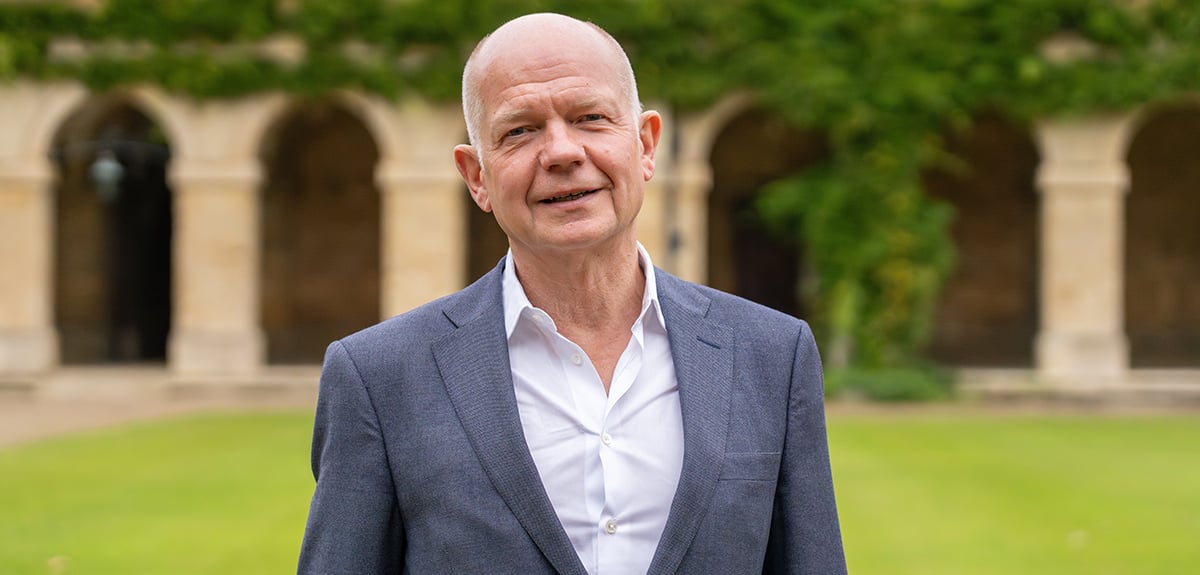
Lord Hague will be formally inaugurated as Chancellor early in the New Year and serve for a term of 10 years. He becomes the 160th recorded Chancellor in the University’s history, a role that dates back at least 800 years.
Lord Hague, the Chancellor-elect, said: ‘Thank you to my fellow Oxonians for placing such confidence in me. I regard being elected as the Chancellor of our university as the greatest honour of my life. I pay tribute to the other candidates, in particular for their commitment to the future of Oxford. What happens at Oxford in the next decade is critical to the success of the UK. I look forward to working closely with the Vice-Chancellor and her team, along with students and alumni, to build on their excellent work. My heart and soul are in Oxford and I will dedicate myself in the coming years to serving the university I love.’
Professor Irene Tracey CBE, FRS, FMedSci, Vice-Chancellor of the University of Oxford, said: ‘I am delighted to welcome Lord Hague back to Oxford as its 160th Chancellor. On behalf of the entire University community, I heartily congratulate him on being elected. I would like to extend my gratitude to the four unsuccessful candidates for their dedication and willingness to serve. William is a great friend to Oxford and is someone who I know will serve and represent this magnificent institution with dignity and vigour. I am personally looking forward to working with him during the remainder of my tenure, and to also engaging with his wife, Ffion, another loyal alum to the University of Oxford. Congratulations once again.’
William Hague graduated from Magdalen College, Oxford in 1982. He has always said that Oxford transformed his life, arriving from a comprehensive school in South Yorkshire to study Philosophy, Politics and Economics. He was President of the Oxford Union.
In the late 1980s, William was heavily involved in designing the Campaign for Oxford, the first part of the university’s development and fundraising efforts that have been highly successful over the last few decades. As an honorary fellow of Magdalen, he has given lectures and seminars for many years.
William is best known for his political career, particularly his time as leader of the Conservative Party (1997-2001) and Foreign Secretary (2010-2014). He also served as Secretary of State for Wales, Leader of the House of Commons, and Minister for Disabled People, in which role he was the author of the Disability Discrimination Act. He spent 26 years as the MP for Richmond, Yorkshire.
Since leaving government, William has divided his time between business, charity and writing. He is a columnist of The Times, has written two historical biographies and is a Fellow of the Royal Society of Literature.
In the first round of the Chancellor election, 23,008 members of Convocation cast their votes for 38 candidates. Lord Hague secured the nomination after the second round of voting for a final list of five candidates, using the Alternative Vote system. Some 24,908 members of Convocation, which consists of University alumni and staff members, cast their votes as follows:
First Stage
- Lord Hague: 9,589
- Lady Elish Angiolini: 6,296
- Baroness Jan Royall: 3,599
- Lord Peter Mandelson: 2,940
- Rt Hon Dominic Grieve: 2,484 (eliminated and votes transferred)
Second Stage
- Lord Hague: 10,472
- Lady Elish Angiolini: 6,915
- Baroness Jan Royall: 3,945
- Lord Peter Mandelson: 3,344 (eliminated and votes transferred)
Third Stage
- Lord Hague: 11,766
- Lady Elish Angiolini: 7,727
- Baroness Jan Royall: 4,662 (eliminated and votes transferred)
Final Stage
- Lord Hague: 12,609 (Elected)
- Lady Elish Angiolini: 11,006
The Chancellor is the titular head of the University of Oxford and presides over several key ceremonies. In addition to these formal duties, the Chancellor undertakes advocacy, advisory and fundraising work, acting as an ambassador for the University at a range of local, national and international events. They also chair the committee for the selection of the Vice-Chancellor.
Lord Hague of Richmond succeeds Lord Patten of Barnes, who announced his retirement from the post in February.
Lord Patten of Barnes said: ‘I am delighted that William has been chosen. He had a stellar time at Oxford and throughout a distinguished political career he has kept in close contact with his college and the University. He will do a great job. He loves Oxford and Oxford will love him.’
The Alternative Vote system was used, whereby voters could rank as many of the candidates as they chose. In the first round lower preference votes were transferred (or not if no alternatives were chosen) from the lowest ranked candidates in order, until the five candidates with the highest number of total votes remained. 23,008 people voted in the first round, and 24,908 people voted in the second round. In the second round, votes were transferred from lower ranking candidates until the winning candidate achieved over 50% of the vote. A breakdown of votes cast and transferred for both rounds can be found here Chancellor Election Round 1 and here Chancellor Election Round 2.